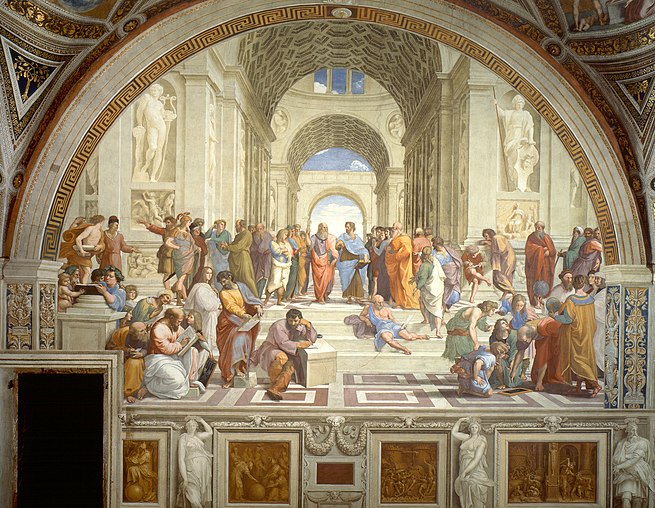
Main Difference
The main difference between Philosophy and Ideology is that the Philosophy is a intellectual and/or logical study of general and fundamental problems and Ideology is a set of ideas that form one’s aims, expectations and actions
-
Philosophy
Philosophy (from Greek φιλοσοφία, philosophia, literally “love of wisdom”) is the study of general and fundamental questions about existence, knowledge, values, reason, mind, and language. Such questions are often posed as problems to be studied or resolved. The term was probably coined by Pythagoras (c. 570 – 495 BCE). Philosophical methods include questioning, critical discussion, rational argument, and systematic presentation. Classic philosophical questions include: Is it possible to know anything and to prove it? What is most real? Philosophers also pose more practical and concrete questions such as: Is there a best way to live? Is it better to be just or unjust (if one can get away with it)? Do humans have free will?Historically, “philosophy” encompassed any body of knowledge. From the time of Ancient Greek philosopher Aristotle to the 19th century, “natural philosophy” encompassed astronomy, medicine, and physics. For example, Newton’s 1687 Mathematical Principles of Natural Philosophy later became classified as a book of physics. In the 19th century, the growth of modern research universities led academic philosophy and other disciplines to professionalize and specialize. In the modern era, some investigations that were traditionally part of philosophy became separate academic disciplines, including psychology, sociology, linguistics, and economics.
Other investigations closely related to art, science, politics, or other pursuits remained part of philosophy. For example, is beauty objective or subjective? Are there many scientific methods or just one? Is political utopia a hopeful dream or hopeless fantasy? Major sub-fields of academic philosophy include metaphysics (“concerned with the fundamental nature of reality and being”), epistemology (about the “nature and grounds of knowledge [and]…its limits and validity”), ethics, aesthetics, political philosophy, logic and philosophy of science.
-
Ideology
An ideology is a set of beliefs and values attributed to a person or group of persons, especially as held for reasons that are not purely epistemic. Formerly applied primarily to economic, political, or religious theories and policies, in a tradition going back to Karl Marx and Friedrich Engels, more recent use treats the term as mainly condemnatory.The term was coined by Antoine Destutt de Tracy, a French Enlightenment aristocrat and philosopher, who conceived it in 1796 as the “science of ideas” to develop a rational system of ideas to oppose the irrational impulses of the mob. In political science, the term is used in a descriptive sense to refer to political belief systems.
-
Philosophy (noun)
The love of wisdom.
-
Philosophy (noun)
An academic discipline that seeks truth through reasoning rather than empiricism.
“Philosophy is often divided into five major branches: logic, metaphysics, epistemology, ethics and aesthetics.”
-
Philosophy (noun)
A comprehensive system of belief.
-
Philosophy (noun)
A view or outlook regarding fundamental principles underlying some domain.
“a philosophy of government;”
“a philosophy of education”
-
Philosophy (noun)
A general principle (usually moral).
-
Philosophy (noun)
A broader branch of (non-applied) science.
-
Philosophy (noun)
A calm and thoughtful demeanor; calmness of temper.
-
Philosophy (noun)
synonym of small pica|nodot=1.
-
Philosophy (verb)
To philosophize.
-
Ideology (noun)
Doctrine, philosophy, body of beliefs or principles belonging to an individual or group.
“A dictatorship, in order to secure its reign, bans things that do not conform to its ideology.”
-
Ideology (noun)
The study of the origin and nature of ideas.
-
Philosophy (noun)
the study of the fundamental nature of knowledge, reality, and existence, especially when considered as an academic discipline.
-
Philosophy (noun)
a particular system of philosophical thought
“the philosophies of Plato and Aristotle”
-
Philosophy (noun)
the study of the theoretical basis of a particular branch of knowledge or experience
“the philosophy of science”
-
Philosophy (noun)
a theory or attitude that acts as a guiding principle for behaviour
“don’t expect anything and you won’t be disappointed, that’s my philosophy”
